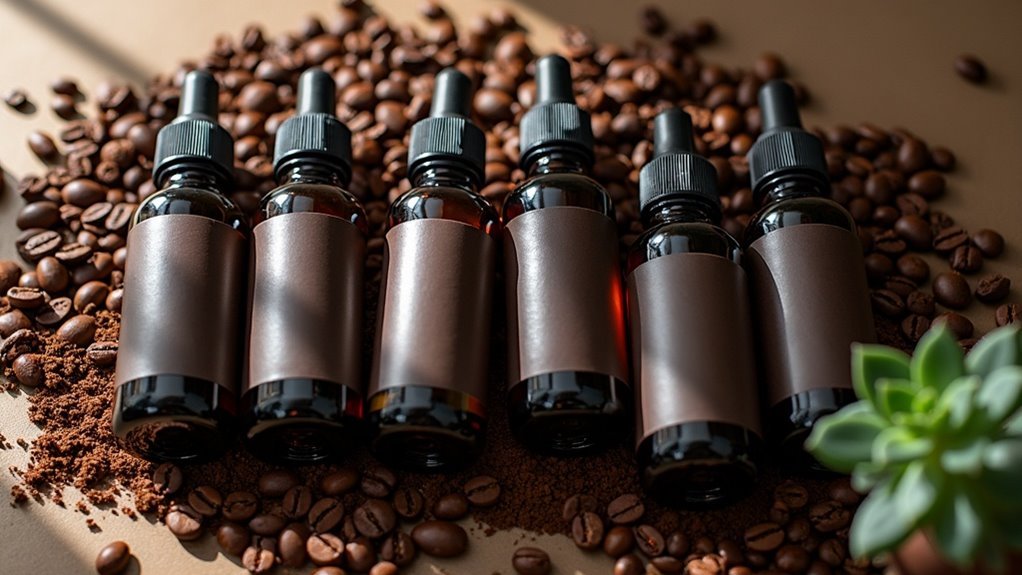Yes, coffee can significantly aid in muscle recovery. The caffeine found in coffee helps reduce muscle soreness and boosts glycogen replenishment when consumed alongside carbohydrates. For optimal results, it’s best to drink coffee within 30 minutes after exercising, as this timeframe enhances nutrient absorption and blood flow, maximizing recovery benefits. Don’t forget to stay hydrated to avoid dehydration. To discover more about effective coffee recovery strategies, continue to explore the advantages of caffeine in your post-workout routine.
Key Takeaways
- Coffee can enhance muscle recovery by reducing muscle soreness and alleviating Delayed Onset Muscle Soreness (DOMS).
- When combined with carbohydrates, coffee can boost glycogen replenishment after exercise.
- The best time to enjoy a cup of coffee for recovery is within 30 to 60 minutes post-workout.
- The analgesic effects of caffeine help block pain perception, which can aid in the recovery process.
- It’s important to stay hydrated while enjoying coffee to maximize its recovery benefits.
Understanding Muscle Soreness
When you enjoy a cup of coffee, you might experience a boost in energy and focus that can last for several hours. This effect is primarily due to caffeine, which stimulates the central nervous system and can enhance alertness.
However, it’s essential to understand the difference between the energizing effects of coffee and potential negative side effects like jitters or anxiety. Supporting your coffee experience involves choosing high-quality beans, brewing methods, and paying attention to your body’s response.
Recognizing how coffee affects you personally is crucial for optimizing your consumption, ultimately enhancing your daily productivity and enjoyment.
The Role of Caffeine in Pain Relief
How can coffee contribute to pain relief during muscle recovery?
Coffee contains caffeine, which acts as a non-selective adenosine receptor antagonist, blocking adenosine from attaching to nerve cells and reducing the perception of muscle soreness.
Research indicates that coffee consumption can significantly decrease muscle soreness scores 48 hours post-exercise, particularly after resistance training.
Coffee consumption may significantly reduce muscle soreness up to 48 hours after resistance training.
The analgesic effects of coffee are linked to its action on A1 receptors, which lower central nervous system activity and enhance pain relief.
Glycogen Replenishment Post-Exercise
To enhance your coffee experience, understanding the role of caffeine in muscle recovery post-exercise can be beneficial. When consumed alongside carbohydrates, caffeine significantly boosts glycogen replenishment, which helps reduce soreness and accelerates recovery. The “golden hour” after exercise is critical for nutrient absorption, making it an ideal time to enjoy your favorite coffee.
| Nutrient | Role in Recovery | Recommended Sources |
|---|---|---|
| Carbohydrates | Replenishes glycogen | Pasta, rice, sweetened milk |
| Caffeine | Enhances absorption | Coffee, energy drinks |
| Timing | Critical for efficiency | Within 30 minutes post-exercise |
Incorporate coffee into your post-workout routine for optimal muscle recovery.
Timing of Caffeine Consumption
Timing your coffee consumption after a workout is essential for optimizing recovery.
Enjoying a cup of coffee within 30 minutes post-exercise can enhance nutrient absorption and reduce muscle soreness, thanks to increased blood flow.
Optimal Post-Workout Timing
While caffeine can be a powerful ally in muscle recovery, knowing when to enjoy your coffee is vital for maximizing its benefits.
Aim to sip your favorite brew within 30 minutes post-exercise; this “golden hour” enhances blood flow and nutrient absorption, essential for ideal recovery. Pairing your coffee with carbohydrates, such as sweetened milk, can markedly boost muscle glycogen replenishment.
Remember, caffeine’s half-life is about 5 hours, so strategic timing with your coffee matters. However, don’t forget to rehydrate with water first.
This approach helps mitigate delayed onset muscle soreness while ensuring you get the most out of your post-workout routine with a delicious cup of coffee.
Caffeine Absorption Rate
Understanding how quickly your body absorbs caffeine from coffee is vital for optimizing muscle recovery. The timing of coffee consumption can greatly impact your recovery process, especially during the important post-exercise period.
Consider these key points:
- Coffee contains caffeine with a half-life of about 5 hours.
- Consuming coffee within 30 minutes post-workout maximizes nutrient absorption.
- The “golden hour” enhances glycogen levels when paired with carbohydrates.
- Caffeine from coffee may reduce delayed-onset muscle soreness (DOMS) more effectively at 48 hours post-exercise.
Creative Coffee Recovery Strategies
When looking to enhance your muscle recovery, incorporating coffee into your post-workout routine can be a creative approach. Caffeine not only helps reduce muscle soreness but also aids glycogen recovery when consumed within 30 minutes after exercise.
Try delicious protein coffee smoothies that blend your favorite brew with protein-rich ingredients for a tasty and nutritious option. Pair your coffee with carbohydrate-rich foods, like sweetened milk, to further boost glycogen stores.
Don’t hesitate to experiment with various caffeine timings and methods, such as iced coffee or coffee-infused energy bars, to discover what best supports your recovery process.
Keep in mind that individual responses to caffeine can vary, so adjust your intake accordingly for optimal results.
Benefits and Drawbacks of Post-Workout Coffee
Coffee can be a valuable addition to your post-workout routine, as it offers several benefits for muscle recovery. Here are some key points to take into account:
Coffee can enhance muscle recovery post-workout by reducing soreness and aiding glycogen replenishment.
- Reduces muscle soreness and helps alleviate DOMS (Delayed Onset Muscle Soreness) after intense exercise.
- Aids in glycogen replenishment when paired with carbohydrates, making it an excellent post-workout beverage.
- Ideal consumption is within 30 to 60 minutes post-workout to enhance nutrient absorption and recovery.
- Moderation is essential to avoid dehydration and side effects like jitteriness; too much caffeine can counteract the benefits.
Remember to prioritize hydration with water before enjoying your coffee to maximize recovery benefits.
Balancing your caffeine intake can enhance your post-workout experience, allowing you to enjoy your favorite beverage while reaping the rewards of your hard work.








